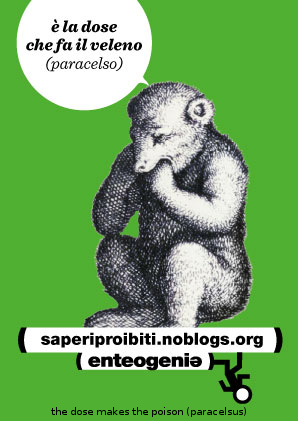 On entheogens lots has already been said and written, both in relation to their traditional use and to their contemporary consumption. But a theme that rarely has been explored is the relations between such experiences, and the social contexts in which they occur and that they contribute in the creation of.
On entheogens lots has already been said and written, both in relation to their traditional use and to their contemporary consumption. But a theme that rarely has been explored is the relations between such experiences, and the social contexts in which they occur and that they contribute in the creation of.
What kind of social structures characterise the people who use entheogens in a ritual manner, and what is characteristic of populations that use these substances in a more ‘private’, underground way?
What considerations on the relation between the subject and the community are fostered by this type of experiences? Is the possibility of a social change inherently connected to the spiritual dimension that derive from the use of entheogens? Is there a link between access to reality and entheogens’ consumption?
The goal of this symposium is to trace a historical, anthropological, sociological and epistemological path that could help understand the relation between the consumption of entheogens and the cultures and social formations in which this practice occur. An attention to the socio-cultural contexts in which these substances are used could help us understand the different roles played by culture and the psycho-physiological characteristics of entheogens in shaping philosophies and social structures more or less libertarian, spiritual or conservative.
That’s why we are interested in understanding what happens when we go from traditional contexts in which entheogenic consumption is linked to collective rituals (e.g. initiation, healing, etc.) to social contexts in which the use of entheogens is of a more underground nature. As a matter of fact, the forms of socialisation occurring in both cases are substantially different: in the former case we’re dealing with a social context in which the entheogenic experience occurs in a ritual, often religious, context that contributes to give a specific sense to the interpretation of the trip. In the second case we are facing experimentations: experiences not necessarily linked to any narrativization, but that contextually produce thoughts on what entheogens mean and how they contribute to the production of specific subjectivities.
In a historic moment like the present one, the question on how the contact with the ‘divinity’ promised by entheogens could contribute to an alternative vision of society, represents a step forward in the analysis of this phenomenon.
The symposium will start from an analysis of the psychophysiological components of the experience, and will then move to an ethnological review of different ritual uses of entheogens, until the most contemporary approaches. The symposium will be of a participative nature, with the purpose of fostering discussion and the emergence of different perspectives.

